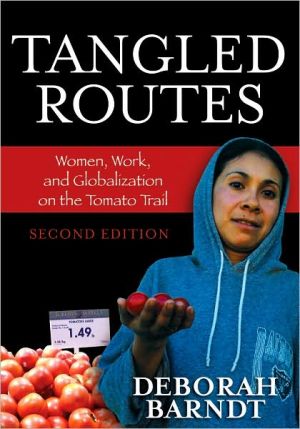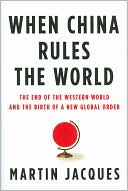Tangled Routes: Women, Work, and Globalization on the Tomato Trail
Where does our food come from? Whose hands have planted, cultivated, picked, packed, processed, transported, scanned, sold, sliced, and cooked it? What production practices have transformed it from seed to fruit, from fresh to processed form? Who decides what is grown and how? What are the effects of those decisions on our health and the health of the planet?\ Tangled Routes tackles these fascinating questions and demystifies globalization by tracing the long journey of a corporate tomato...
Search in google:
Now in a thoroughly revised and updated edition, Tangled Routes offers a vivid interdisciplinary examination of the global food system through the journey of a corporate tomato. Through case studies in the three NAFTA countries-Mexico, the United States, and Canada-Deborah Barndt examines the dynamic relationships between production and consumption, work and technology, biodiversity and cultural diversity, and health and environment. The compelling stories of women workers along the tomato trail humanize her analysis of globalization, taking into account the intersections of gender, race, class, family status, and north-south relations.
Acknowledgements Introduction: Roots and Routes 1. Across Space and through Time: Tomatl Meets the Corporate Tomato 2. Frames and Filters: Theoretical and Methodological Approaches 3. Arch Deluxe with a Smile: Women Never Stop at McDonald's 4. You Can Count on Us: Scanning Cashiers at Loblaws Supermarkets 5. On the Move for Food: Truckers and Transnational Migrants 6. Picking and Packing for the North: Agricultural Workers at Empaque Santa Rosa 7. Crossing Sectors and Borders: Weaving a Holistic Analysis 8. Cracks in the Corporate Tomato: Signs of Hope Epilogue Index About the Author
\ June 2009 ChoiceBarndt provides a rare synthesis of academic scholarship with an eminently accessible presentation of a social activist. Her writing style and liberal use of photographs are unusual in an academic work, yet Barndt's scholarly credentials are strong. Highly recommended.\ \ \ \ \ Canadian Woman StudiesDescribes in vivid detail the intricate path of the commodified tomato from the agricultural fields of the South to the fast-food restaurants and supermarkets of the North.\ \ \ Book Review DigestThe life histories of the women workers are insightful and compelling, and . . . the photographs are superb.\ \ \ \ \ Just LabourThe author examines concepts old and new in an innovative, creative, and thoroughly engaging manner by mixing a strong writing style with a series of contextualising photographs. . . . An excellent interdisciplinary text that is equally useful inside and outside the classroom.\ \ \ \ \ HorizonsIn this extensively-researched book, Deborah Barndt shines a spotlight on the "corporate tomato". . . . An extensive index makes this an essential addition to the libraries of people concerned with justice. 2008\ \ \ \ \ Feminist TeacherTangled Routes has much to offer a feminist classroom. The flexibility of Barndt’s chosen methodology allows her to focus on one product within the entire process of getting the product from the field to the table. The magnitude of the project—globalization from above and from below—also suggests that qualitative research can be a laborious and painstaking process. It is an example for students to learn how the scope of a project may inhibit an in-depth analysis of a particular feature if there are many other different and complex parts to examine. Instructors may also explore other possible themes to use in their classrooms, such as women and work, social oppression, or cultural/corporate hegemony. Barndt’s thoroughness in explaining occurrences within the food system as well as the stories of individuals directly or indirectly involved with the process, discloses an array of ideologies embedded within the global food system. Unveiling these social beliefs can elicit thought-provoking classroom conversations, allowing for rich analyses of the intersections taking place along the tomato trail.\ \








